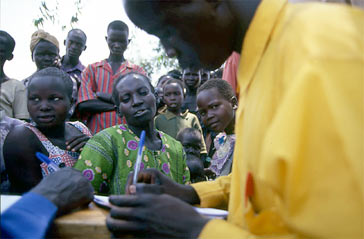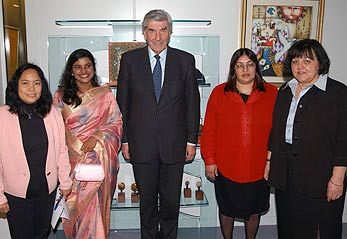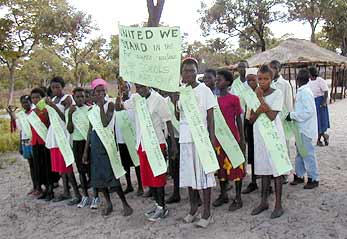Lubbers seriously concerned about insecurity in Afghanistan
Lubbers seriously concerned about insecurity in Afghanistan

GENEVA, April 17 (UNHCR) - UN refugee agency chief Ruud Lubbers today cautioned that refugee returns could be threatened by rising insecurity in parts of Afghanistan, and urged the Afghan authorities and international community to take concrete measures to strengthen security in the country.
"UNHCR and its partners have worked hard to help more than 2 million people return home over the past year, but the sustainability of those and future returns is now being jeopardised by insecurity in parts of Afghanistan," said Lubbers in a press statement Thursday. He was responding to recent outbreaks of violence in the country.
The High Commissioner stressed that it is "absolutely crucial" for Afghan authorities and the international community to take measures to strengthen security in the country, particularly in rural areas.
"It is in everyone's interest that security be promoted and strengthened in Afghanistan," he said, reminding donor governments, particularly in Europe, that consolidating stability in Afghanistan also has a direct impact on the number of Afghans seeking asylum outside the region. In 2002, for example, the number of Afghans seeking asylum in Europe dropped by more than 50 percent.
"This positive trend could easily be reversed if the more than 3 million Afghans still in Iran and Pakistan once again lose hope in being able to go home," said Lubbers.
UNHCR called for concrete action to improve the security situation in southern Afghanistan. It warned that lack of security could trigger a vicious cycle of reduced humanitarian access, less development aid, fewer returns and further instability - all in an area already suffering the effects of years of drought.
Following the recent murder of an aid worker from the International Committee of the Red Cross, more than 10 international non-governmental organisations have pulled staff out of Kandahar, at least on a temporary basis. UNHCR's Spin Boldak field unit has been closed since the war started in Iraq on March 20. Operations at the Chaman border with Pakistan have also been restricted or stopped.
Large areas of south-eastern Afghanistan - including the whole of Uruzgan and Zabul provinces - remain off-limits to aid agency staff because of the dangers. Other areas can only be accessed using armed escorts. In eastern Afghanistan, security concerns have delayed the establishment of a new iris recognition centre in Khost. In Nangarhar, UN activities have been on hold since January, following the killing of two guards who were escorting a UNHCR team.
UN activities have also been curtailed in the north-west, following a new outbreak of inter-factional fighting near Maimana, west of Mazar-i-Sharif.
Displaced Afghans are still fleeing harassment and insecurity in the north - from Faryab, Jawzjan and Badghis provinces. Many end up in the south, joining an estimated 350,000 internally displaced persons, most of them living in six settlements in Kandahar and Helmand provinces.





